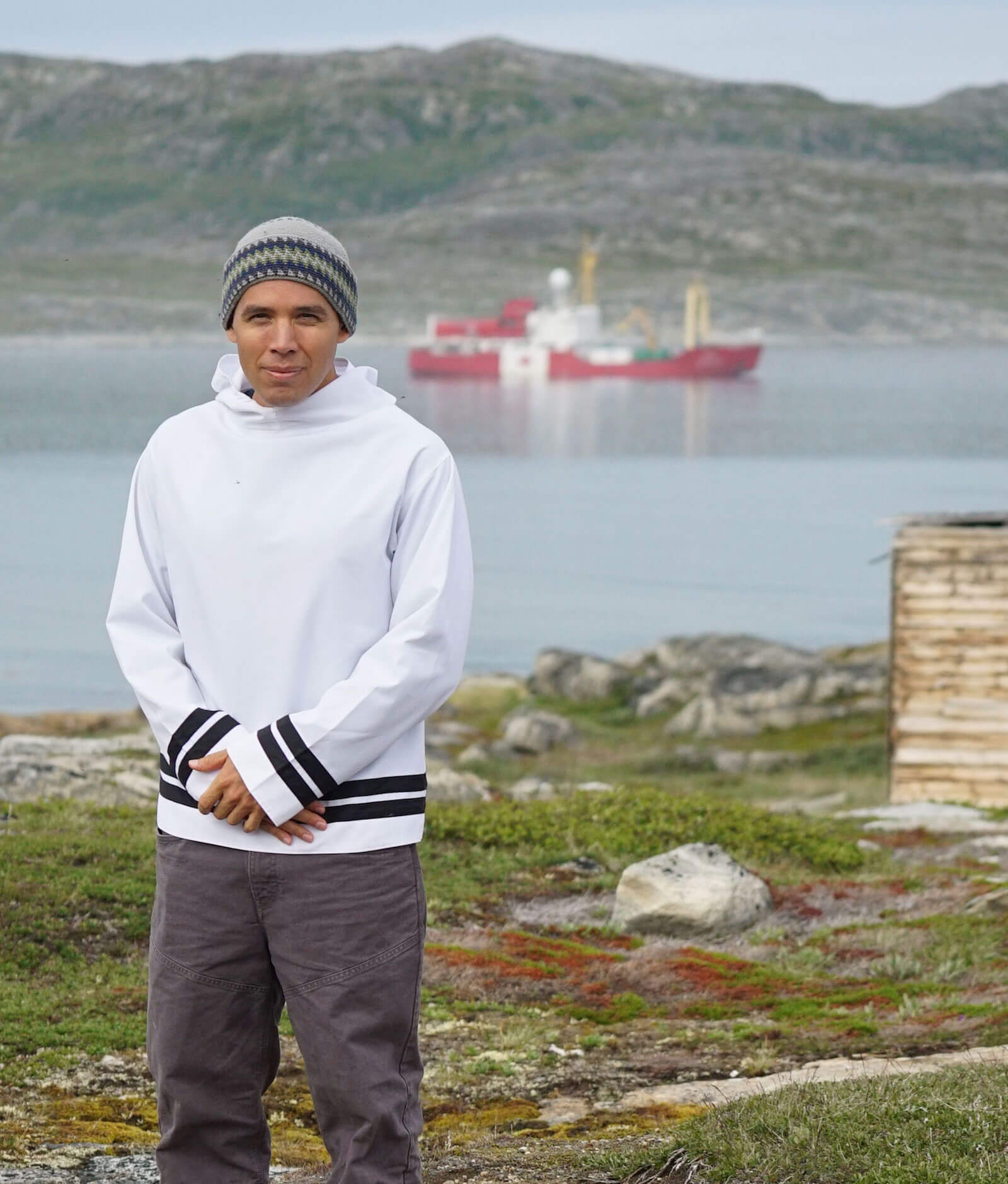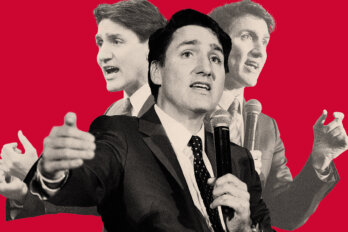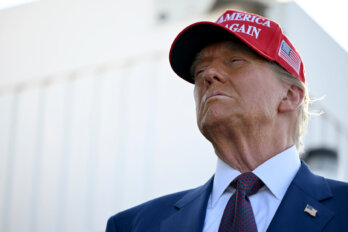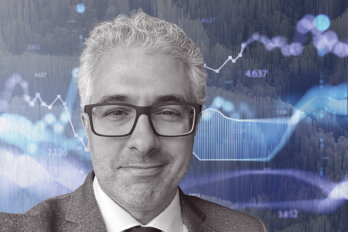When Natan Obed ran for president of Inuit Tapiriit Kanatami (ITK) in 2015, the organization that represents Inuit to the Canadian government, he was the youngest of the three candidates—and the only one who wasn’t fluent in an Inuit language.
Cathy Towtongie, now a representative in the Nunavut Legislative Assembly, was on the ITK board at the time. “What do you recall in your Inuit identity,” she asked Obed during the election, “that you have not lost while you’ve gone through the Western education and society?”
Obed’s family hadn’t spoken Inuktitut at home, and though he is from Labrador, he spent his teenage years in the United States. “The fact that I don’t have fluency in Inuktitut is only one small part of who I really am,” Obed replied. He spoke about the culture he was honoured to inherit and about what it meant to him to be Inuk: “Whether it’s not knowing who’s going to come over for supper because you have an open-door policy. . . . Or whether it’s learning by watching rather than learning by books. Or whether it’s the respect that we have for our elders. Or the respect that we have for the land. . . . All those things I appreciate and know.”
Obed went on to win that election, his first for ITK, with 54 percent of the vote. He reflects a new generation of Inuit in Canada: at forty-two, his youth makes him an apt leader for a population of 65,000 of which more than 50 percent are under twenty-five. Like him, many younger Inuit have family members who were forcibly relocated from their home communities, who were sent to residential school, and who were separated from their families by churches, the government, or both.
The exchange with Towtongie struck a nerve among Inuit who, like Obed, have similarly been asked about their knowledge of culture—who have been told they aren’t “Inuk enough”—and encapsulated long-standing trauma in a community where different people, and generations, are wrestling with the legacy of having their traditions stripped away.
“Those of us that have gained back our identity and gained back our skills as an Inuk,” Towtongie told me later, “can recognize a person who’s lost [their] own culture.” Forced into residential school herself, Towtongie says the Western education system often “teaches that Indigenous people like myself are savages, we are a little less intelligent, more like animals.” It isn’t that Western education today is necessarily bad, Towtongie says, but it changes your mindset and separates you from your community.
For many Inuit, much of this mindset is captured in language—and today Inuit languages, including Inuktitut, Inuvialuktun, and Inuinnaqtun, are nearing a crisis point. According to the latest census, only 56 percent of Inuit children under fourteen years old speak an Inuit language as their mother tongue. Jesse Mike, who used to work with Obed in Iqaluit, argues that questioning an Inuk’s identity based on their language skills can be cruel, echoing colonial efforts to erase Indigenous culture. “Many Inuit and [I]ndigenous people were shamed and physically abused for speaking their own languages,” she wrote in a letter to the editor of Nunatsiaq News after the election, decrying Towtongie’s line of questioning. “Now we have ‘leaders’ abusing fellow Inuit for not speaking the language that was taken from them.”
Obed isn’t impervious to the concerns Towtongie raised. He’s been studying Inuktitut for years, and says he understands it better than he speaks. But as a leader, Obed doesn’t feel he can afford the inevitable stumbles that come with speaking a new language in public. “The fear I have,” he told me later, “is one of not wanting to . . . speak in a way that disrespects our language or [not wanting to] show any sign of weakness from this position to Inuit.” (He tends to only use common words—nakurmiik (ᓇᑯᕐᒦᒃ, thank you) and taima (ᑕᐃᒪ, finished)—in public.)
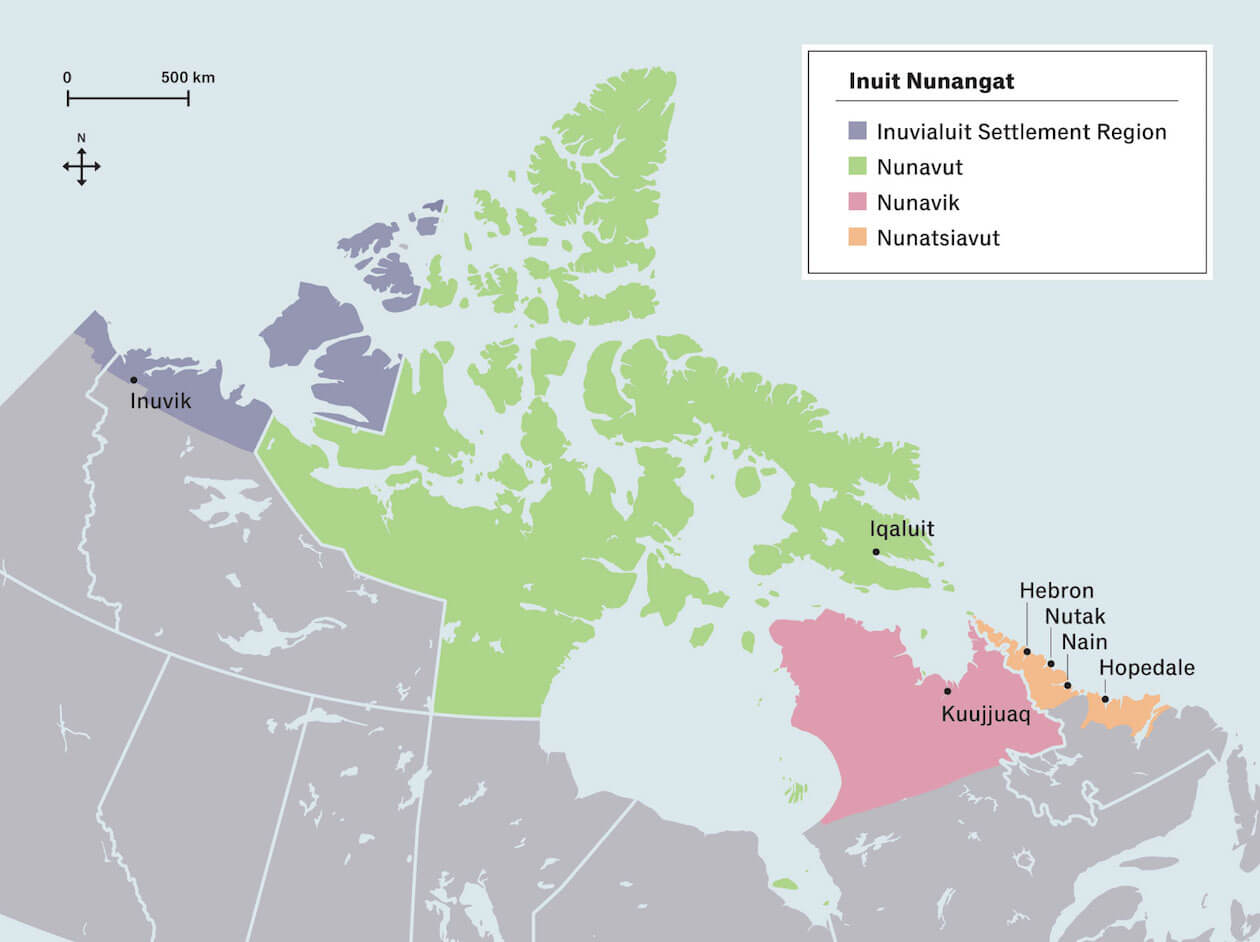
A truism in politics: most communities aren’t eager to be led by an outsider. But, for Inuit, Obed says, there is an added layer of wariness, born of centuries of colonialism, against newcomers to the culture. He agrees that guardedness is warranted, even when it’s directed at someone like him, who didn’t choose to grow up away from their homeland.
Those who newly claim Indigenous identity, Obed says—whether because they feel they no longer need to hide it or because they’ve only recently discovered some Indigenous ancestry in their family tree—may be regarded with suspicion, especially if they begin to identify as Indigenous without taking steps to get to know their community. Which is why, over the past two decades, Obed has had to earn his right to claim a place among Inuit, let alone to become their national leader.
Though he’s not the first ITK president to struggle with Inuktut (the general term for Inuit languages in Canada), Obed’s ability to articulate the tensions that surround this cultural dislocation distinguishes him from his predecessors. Obed has spent most of his life protecting his identity: almost everywhere he goes, he’s seen as an outsider. In talking about these struggles publicly, and with a savvy use of media to explain Inuit culture and governance, Obed is conveying a modern, nuanced idea of what it means to be Inuk—a picture that includes the effects of colonialism across generations and supersedes long-held stereotypes.
Inuit Nunangat is the homeland of Inuit in Canada. Currently, it is divided into four separate land-claims regions, three of which are contained within the borders of another province or territory: Nunatsiavut, in northern Labrador; Nunavik, spanning northern Quebec; the territory of Nunavut (which has a government that serves both Inuit and non-Inuit); and the Inuvialuit Settlement Region in the Northwest Territories and the Yukon. Inuit Tapiriit Kanatami— the name means “Inuit are united in Canada”—is composed of representatives from each of these land-claims regions; it is currently the main organization where they can work collectively and across jurisdictional boundaries. The long-term goal is for Inuit Nunangat to stand as its own cohesive entity alongside Canada’s provinces and territories, with similar responsibilities and powers.
Implementing that vision has been slow. Land-claims negotiations began in the early 1970s; the most recent one was only finalized in 2006. And, though the land claims now have their own governing bodies, they don’t yet have the resources required to manage key policy files, such as education and health. Inuit in Labrador, for instance, still follow the Newfoundland and Labrador primary and secondary school system; the Nunatsiavut government hasn’t yet been able to create an Inuit-specific curriculum.
Throughout his presidency, Obed has had to explain to non-Inuit officials how ITK’s structure could eventually support a fully functioning system of self-governance. Often, those officials, and the public in general, know so little about Inuit history and identity that he has to start from scratch. Sometimes it is as simple as explaining that Inuit are different from First Nations and Métis people—in the past, the federal government has failed to distinguish between them. When the 2016 budget was announced, for instance, little money was specifically allocated for Inuit: funding was, for the most part, directed to Indigenous priorities broadly, without reflecting the needs of different groups.
Because ITK doesn’t have jurisdiction over Inuit regions, Obed is aware that he can be perceived as a prop. “When I go to events, and when I pick out what I’m going to wear, there’s always a conscious decision that I make about how much I show of the Inuit identity and culture,” he says. Sometimes, he’ll opt for his business suit rather than a silapaaq (ᓯᓚᐹᖅ), a hooded shirt traditionally worn as an outer layer to cover the parka, and dress shoes instead of kamiik (ᑲᒦᒃ), boots made with seal or caribou skin: in a jacket and tie, he’s dressed in a way non-Indigenous politicians can better relate to.
In the short term, Obed hopes to persuade the federal government to defer to Inuit leaders when making decisions that affect Inuit communities. For him, it’s not just about how much money the government invests in Inuit but who gets to manage that funding. Little of what the federal government does invest, Obed says, involves “interaction or participation with Inuit themselves.”
On paper, at least, Obed is beginning to see results: the 2018 federal budget mandated that just over $500 million be invested over ten years in Inuit-led, Inuit-specific housing and health programs—priorities ITK had identified. It also acknowledged Inuit Nunangat by name, a first for the Inuit homeland in a federal budget.
This past summer, Obed spent three days touring Nunatsiavut with environment minister Catherine McKenna. It was her first time in the Arctic and the first time she’d learned that in the 1950s the Canadian government forced several Inuit communities to relocate to new locations in the North. She also began to learn about modern Inuit life. Before the trip, she says, “I didn’t really understand the concept of Inuit Nunangat.”
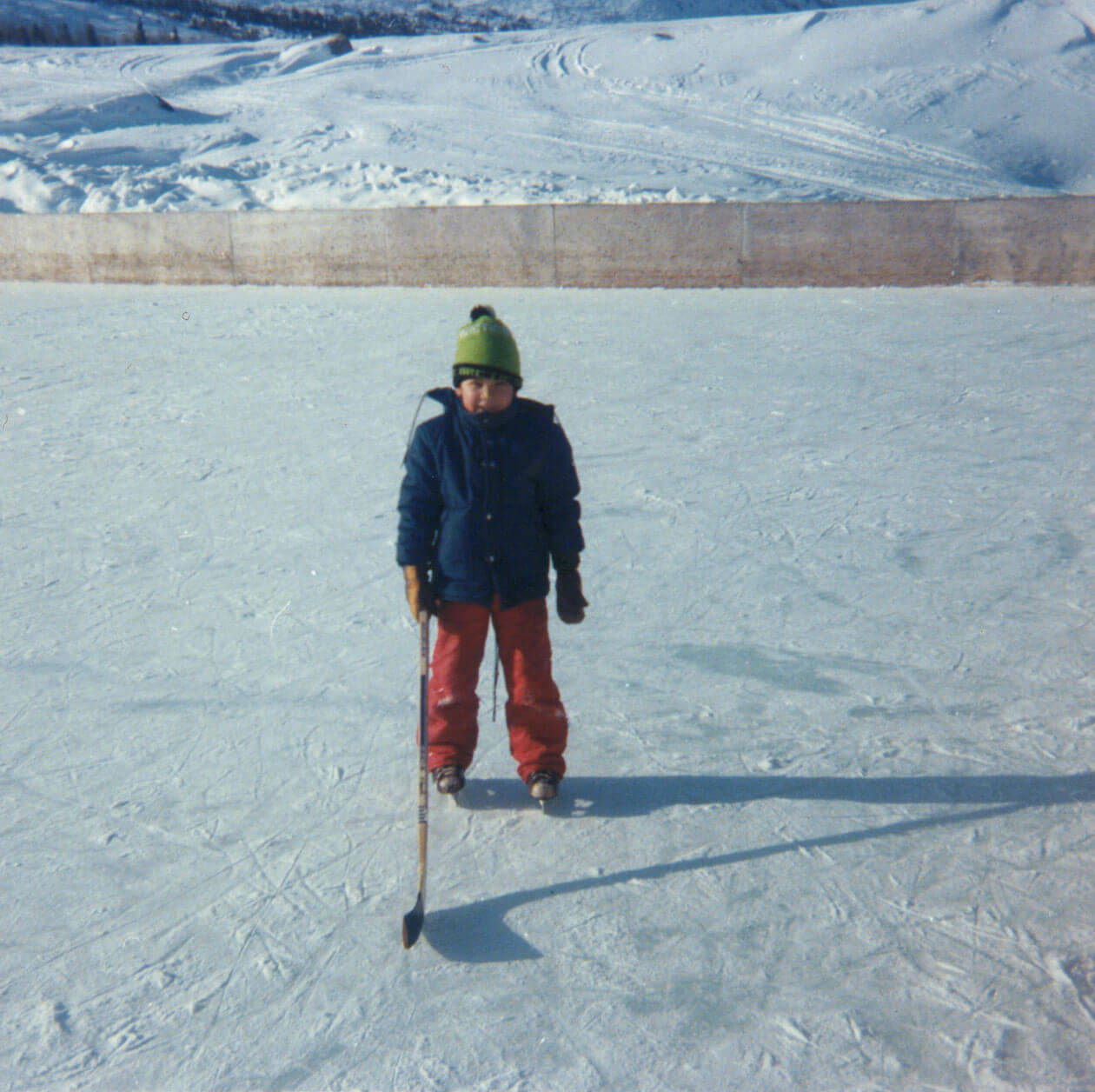
“It’s a different way of thinking, and it requires some imagination,” says McKenna. “It’s hard, I think, for government to do this, because we’re really reimagining how spaces are defined, how our country is defined.”
“We have reimagined it,” Obed says later. “Now it is up to the federal government and the provinces and territories to respect and accept the political and geographic areas of Inuit Nunangat rather than still trying to figure out how to serve our populations in a way that makes sense to them and not us.” The seeming reluctance to fully empower Inuit is a sore point for Obed, who has had to repeatedly point out how Inuit leadership is excluded by government. One recent case: the date of and agenda for last year’s annual first-ministers meeting—in which provincial and territorial premiers and Assembly of First Nations, Métis, and ITK leaders gather to meet with the prime minister—had been set without consulting the Indigenous leaders, a decision Obed protested. “That is not a renewed relationship,” Obed told the CBC at the time. “That is a paternal way of imagining what the priorities are that one group wants to talk about to another.”
Obed plans to run for ITK president again this fall. But whether or not he’s re-elected, after moving on from ITK, he says, he eventually might want to return to Nunatsiavut. (Obed currently splits his time between Ottawa, where ITK is headquartered, and Iqaluit, where his wife and children live.) One of his friends predicts he’ll be a senator someday. Others hail him as a future prime minister. Obed himself isn’t so sure: he tends to avoid large crowds and says the way parliamentarians treat each other during question period “turns my stomach. . . . And I especially don’t think it’s indicative of how Indigenous peoples treat one another.”
Last summer, he joined a week-long leg of Canada C3, a voyage by ship along the country’s coastline to mark the sesquicentennial. Even though he’d be participating in the portion of the trip that covered the coast of Nunatsiavut, his homeland, Obed was reticent at first. “I was worried . . . that I was going to be used in a performative manner. I didn’t want to be a tour guide or the colour”—he chuckles—“to go along with the environment.” At one point that week, I asked Obed if he ever tired of his role as cultural ambassador and government intermediary. “I signed up for this,” he said. “But I do feel sometimes like I’m trying to explain to every last Canadian about Inuit, and I don’t think I have that much stamina.”
“Children don’t choose where they grow up,” Obed told me when we met in his office in Ottawa last fall. “They don’t choose the language they speak.”
Obed’s parents met at a residential school. Enoch Obed was about seven years old when his family was relocated from Nutak, one of the northernmost settlements in Labrador, farther south to Hopedale, in 1956; he spent the rest of his childhood in the Grenfell Mission in St. Anthony, Newfoundland. Obed doesn’t know much about his father’s experiences there. “It obviously affected the way that he parented, the way that he saw the world, the way that he dealt with his emotions and affected his mental health,” Obed says. “But it was never something that he could talk about.”
When Enoch was seventeen, he met Ellen Bryan, a twenty-year-old university student from Maine who was volunteering at the school. By coincidence, they met again soon after in North West River—a town farther north, in Labrador, where Enoch was visiting his brother and where Ellen had moved to teach at the local school. The couple married and ended up in Fredericton, where Natan was born. The family moved around often when Natan was young, but his strongest memories are of Nain, in Labrador. It wasn’t an easy time: Inuit families that had been relocated had been placed in substandard housing; for some time, Natan’s family didn’t have running water. But relatives who were around during Natan’s early childhood still live in Nain; even now, he says it is where he feels most grounded.
When Natan was twelve, Ellen moved back to Maine—she and Enoch had separated several years earlier—and brought her children to live with her there; Natan wouldn’t return to Labrador for another twelve years. But he always identified as Inuk, and their home always had touches of the land they’d left: carvings and wall hangings, mats and tablecloths embroidered by Inuit Ellen had met during her time in Nunatsiavut. “She made sure that I had the understanding of my identity and my rightful role in the world,” says Obed. Enoch’s relatives visited every summer.
Obed credits hockey with getting him through his childhood. “I think we moved eighteen or nineteen times,” he says. “And I never had a peer group that stayed with me for more than one or two years.” On the ice, all that changed. “The world that you create within your team is something . . . that is apart from anything else in your life. And there’s certainty in that.”

He was also good at it: Obed would go on to play in the New England college-hockey circuit and Junior A with the Helena Ice Pirates. But hockey wasn’t always an escape. While playing, he was called “every name in the book,” he says. “I kind of lose track a little bit. Nigger and monkey boy were the biggest names for the people who thought I was African American, black. Sand nigger I think was for the Middle East. And then spick and then chink, and then people who thought I was Native American, there was all sorts of ethnic slurs they would use for me.”
When he talks about this period, his jaw tenses visibly, his eyes focused on a spot in the distance. He recalls one particular incident at a rink in Montana: “There was a woman in Billings who would make a sign, and it was Monkey Boy #2, and she would have it right up against the glass, and she would put bananas on the end of the hockey stick, and she’d dangle it over the bench.”
The attacks didn’t deter him from hockey; he still plays today. Injuries prevented him from continuing professionally, however—and Obed says he wouldn’t have made it to the NHL anyway. (His friends say otherwise.) He eventually earned a scholarship to study at Tufts University, in Massachusetts, where he was one of the only Indigenous students in his program. As with hockey, few of his peers could guess his background. Because of his name, some assumed he was Jewish (“Natan” is the name of an Old Testament prophet; it means “gave” in Hebrew), which might explain why, when he applied for a student job, he was assigned a post in reception at the campus Hillel centre. “That is actually an interesting way to go through the world,” he says. “Being vaguely different, vaguely ethnic.”
Even though he’d always identified as Inuk, for many years Obed hadn’t felt that he’d spent enough time in his homeland to speak about it with much authority. His studies presented an opportunity to change that. He’d chosen to examine the potential effects of the Labrador Inuit land claim, which was still under negotiation, for his undergraduate dissertation. When he received a grant for the project, he decided to use the funds to return to Nain, where Enoch still lived. “Some people didn’t know that my father had children,” he says. “And then a lot of older people remembered me from when I was young and were really happy to see me, and so it was a variety of different responses.”
Enoch had been a leader in his own right, as a minister and a negotiator on Labrador Inuit land claims while Natan was a child, and as a mental-health counsellor for Innu First Nations communities later on. But he also suffered from alcoholism. At home, Enoch had been abusive and distant. (When he was eleven, Natan decided that he would never drink.)
When Obed returned to Nain, he was shocked to find his father living alone in a nearly empty house, having been unemployed for months. “He avoided my questions, avoided me in general,” Obed later wrote in his dissertation. “If I had been welcomed back by my father, it would have been easier to establish relationships with my other relatives inside the community, and easier to be accepted by the community as a whole.” Enoch passed away a few years later, still largely a stranger to his son.
Though Obed is usually very private, he purposefully selects some stories to share—including ones about his father. “There are a lot of people, a lot of Inuit, who have gone through similar things . . . who have grown up in abusive households, who have had alcoholic parents who have been to residential school, who have felt abandoned by their parents,” he says. “Sometimes, we don’t have peers or role models within our communities. And I do hope that I can be a peer to a whole group of Inuit who feel like their personal histories are in some way linked with what I have been saying.”
But it isn’t straightforward; Enoch was also respected in his community. “My father is loved by many people, and I don’t want to undermine that,” Natan says. He still gets stopped by people who remember his father, and he’s been told that, as a leader, he takes after Enoch. Gary Baikie, a superintendent at Torngat Mountains National Park in Nunatsiavut, has worked at different times with both Enoch and Natan. “Soft-spoken, but very deliberate,” he says of them both. “And [they] certainly got their points across, even though they didn’t need to raise their voices.”
Obed takes a long pause when I tell him this. “People have talked to me about some of the similarities, especially in public speaking,” he finally says. But he prefers not to make too much of it. “Honestly . . . I like there to be a separation between who he was and who I am.”
Obed returned to Canada after graduating from Tufts and worked for ITK in Ottawa for a year before moving to Nain to work for the Labrador Inuit Association. He made his mark in his hometown, helping out with a men’s hockey league and coaching kids’ hockey. Richard Pamak, a friend and fellow hockey player, took Obed under his wing, inviting him on hunting and fishing trips so he could get to know the land. “I don’t think I felt that I needed to do it,” Pamak says. “It’s normal for us to ask people to go along. ‘Wanna go huntin’?’ It was that.” And Obed usually did.
In 2008, Obed ran for the presidency of Nunatsiavut, the Inuit land claim in Labrador. In doing so, he was challenging the region’s constitution, which requires the leader to be fluent in Inuktut. He lost to Jim Lyall, a former postmaster and then mayor of Nain, who had lived in Labrador all his life. (It was only later that Obed learned his father had also run for the presidency, in the 1980s, and lost on the grounds of language ability.)
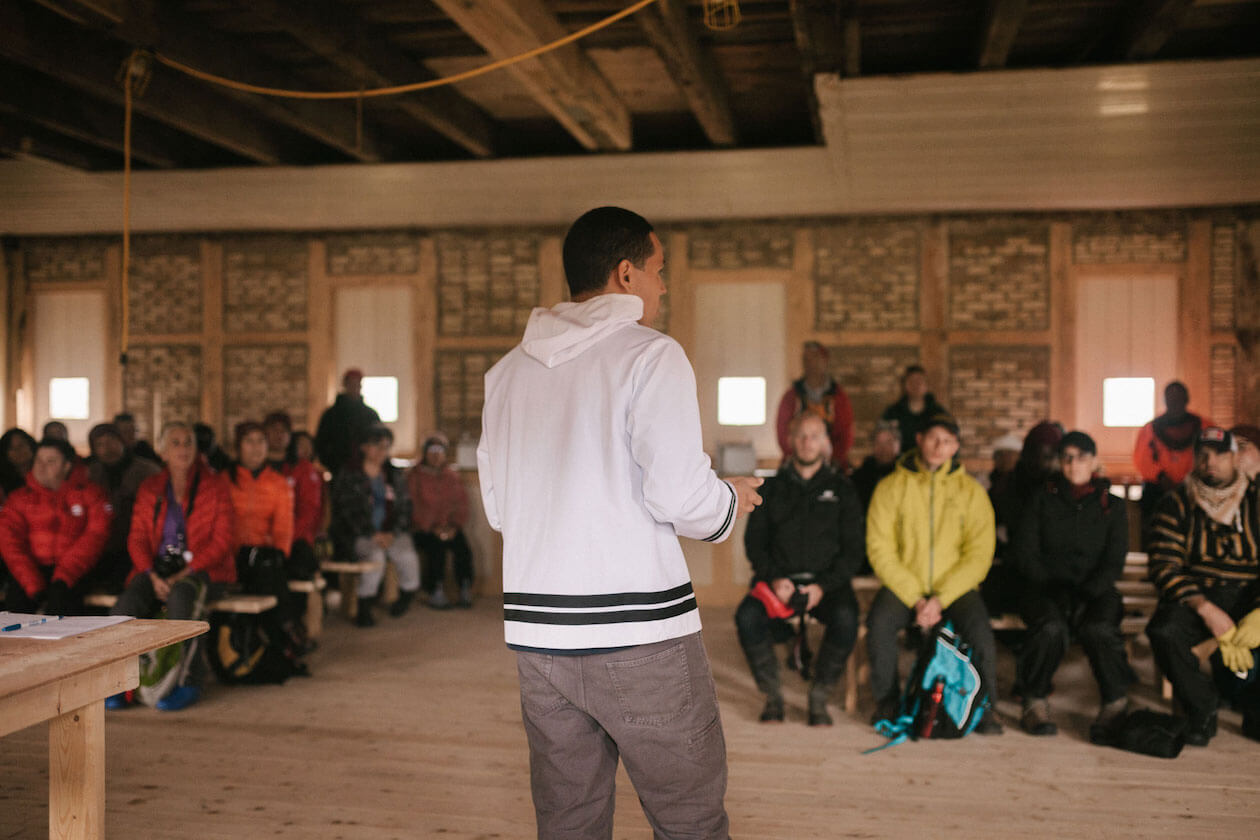
Whenever Obed speaks, he inhales quickly, then pauses for a moment. Though he rarely raises his voice or swears, it’s easy to tell when he’s frustrated: the pause lasts milliseconds longer, and his words become more cautious. So when we talk about that campaign, I get the sense that he’s had this conversation with others, and with himself, many times over. “We’re at such an interesting place,” he says. “The symbolism of being able to speak Inuktitut versus the practicality of being able to create a self-government from scratch are two very different things. We can get lost in this argument for the next generation.”
Though he doesn’t believe Inuit should be excluded from leadership positions based on language ability, Obed has made preserving and supporting Inuktut a priority, both in his role as ITK president and in his personal pursuits. For years, he served on the board of Tumikuluit Saipaaqivik, an Inuktitut-language daycare in Iqaluit that opened its doors in 2007. Last June, the federal government announced it would be working (with ITK, among other organizations) to develop legislation protecting Indigenous languages. Following the announcement, Obed publicly highlighted efforts Inuit have made on their own to preserve their language, including an ITK task force that’s developing a unified writing system for Inuktut, to facilitate producing educational materials and official documents while still allowing various Inuit regions to maintain their local dialects.
“I think there should be more opportunities for all Inuit to connect to culture and language,” he tells me later, “so that we don’t continue to create generations of Inuit that have an incomplete skill set and know it and feel bad about it themselves and are made to feel bad about it by some other people.”
Towtongie, the ITK board member who questioned Obed when he ran for ITK president, comes from an older generation. She grew up with Inuit knowledge passed on by both her parents—remembering, for example, how her father had been conditioned throughout his life to drink water only in small sips, in anticipation of times when freshwater or ice weren’t always available.
Traditional education prepared Inuit from childhood for a life of adapting to the land, rather than trying to impose their expectations on it; without understanding these things innately, Towtongie believes, it is very difficult to fully represent Inuit people. And then there are more abstract ideas that shape her thinking—the very concept of truth is different for her and many Inuit, she says. By way of example, Towtongie tells me to picture an Inuk elder in court; when asked to tell the truth, the whole truth, and nothing but the truth, she goes on, he declines to do so. “I can only tell you what I know,” would be the elder’s response in such a context, she says. There are few topics on which one can speak the whole truth, Towtongie explains, “for instance, the land, water, and moon.”
She viewed Obed’s response to her during the ITK election as defensive—a quality, she says, her elders often attributed to non-Inuit. “It’s too easy to react,” Towtongie says. “The coping mechanism we were trained [in was] to hold it. Hold it. Think it through. Don’t react at the moment.” Towtongie worked with Obed for years at Nunavut Tunngavik, the organization that manages the Nunavut land claim. She says they had a good working relationship and tells me that “Natan is a good person. I’m not putting him down.” However, she says, because of his upbringing, he is out of touch with the Inuit world view.
Two months after being elected president of ITK, Obed published an op-ed in the Globe and Mail. In it, he urged the Edmonton Eskimos to drop their team name, calling it “an enduring relic of colonial power,” and he extended his demand to sports teams such as the Washington Redskins and the Cleveland Indians. Using Indigenous peoples as mascots, he wrote, mocked their identities and reduced whole cultures to inane symbols. Inuit of all ages questioned Obed’s priorities. Why worry about a football team when there are far more urgent issues to address—suicides among Inuit youth, alarming rates of tuberculosis, a housing crisis? “Western society adores [Obed],” Towtongie says. “They love the way he talks, they love the way he writes articles. . . . [But], in the elder’s mind, there would be gaps in what he’s speaking about, because he hasn’t experienced it like an Inuk.”
In Inuit tradition, children are often named after respected family or community members. Panigusiq, Obed’s eldest son, is named after his maternal grandmother, who died a few months before he was born. (Traditional Inuktut names aren’t gendered.) A beloved leader, Mary Panigusiq Cousins was one of the founders of Inuit Tapirisat of Canada, ITK’s predecessor, and worked as a teacher and an editor of Inuktitut magazine for many years.
Though the naming practice follows tradition, Natan and his wife, Letia, worried Panigusiq might get teased about his name once he was older. But they felt it important to continue the tradition, says Natan. As part of the naming protocol, he says, people address Panigusiq as though he were his grandmother; characteristics of the deceased are thought to carry on through their namesakes. “It’s a really thoughtful and integrating way of ensuring that a person’s legacy lives on and that the love that . . . people have for an individual carries for generations,” says Obed.
Like Natan, Letia comes from a mixed background: her mother was Inuk from Pond Inlet, Nunavut; her father was white and born in Saskatchewan. “If there’s anything I can give my kids in relation to identity, it’s to grow up in a place of strength,” Natan says. “They don’t have to conform to one specific identity because other people might want them to.” Natan and Letia met in 2005, during a meeting about the Kelowna Accord—a multi-billion-dollar, ten-year plan to improve infrastructure, health, housing, and education in Indigenous communities that has never been implemented.
Letia lives with their two sons (Jushua, named after Natan’s great-uncle Josua, is the younger) in Iqaluit. “I love that they’re growing up in Iqaluit and that they are Inuit and they grew up with other Inuit children and they speak Inuktitut and they eat country food,” Natan says. “I also make sure that they go visit my mom and my family in Maine and that they know they have relatives that are not Inuit that live in a very different reality. I want them to celebrate that too.”
The boys often join Obed for fishing trips. During one trip last summer, Jushua and Panigusiq had been learning how to harvest and prepare country food, traditional Inuit foods. “So my eight-year-old is eating [Arctic] char . . . eyeballs without hesitation—just, this is what you do—and then his honest reaction is not one of ‘this is gross’ but ‘this is a new taste and this is a part of what it means to eat in my life.’ Those are really great moments for me.”
There’s a hush over Nain, a town of just under 1,200 and the northernmost community in Newfoundland and Labrador. It overlooks a small inlet, where a few islands stand between the town and the Labrador Sea. No roads lead here; Nain is accessible only by air or sea. It feels like a secret, sheltered spot.
This is the place Obed calls his hometown. And on a grey and windy day last July, it became the starting point for our week-long leg of the Canada C3 voyage. The twenty-two participants in this portion of journey included artists, students, doctors, scientists, community activists, and politicians, few of whom knew Inuit history and culture. The Polar Prince would take us northward along the eastern coast of Labrador, with stops in Torngat Mountains National Park, to Iqaluit.
Though he never pointed it out himself, Obed was one of just two or three people who identified as Inuk on the ship. He often finds himself the only Inuk in a room, and with that reality comes the constant risk of being tokenized. He believes that, because of his role, he has to make himself accessible to non-Inuit who are curious about his culture, though it isn’t easy. Many Indigenous people, he told me, “feel that there’s an entitlement, a colonial entitlement, that goes along with people being able to ask you random questions about your identity or your people. Going out of the blue, just saying, ‘Why is it that your society has such high rates of suicide? Tell me about that.’”
After leaving Nain, C3 headed to Hebron, which had been established in the 1830s by the Moravian church, a Protestant denomination. When Newfoundland and Labrador joined Confederation in 1949, it decided to centralize Inuit communities, without consulting Inuit themselves. In 1959, a ship arrived in Hebron to move the community, along with the residents of Nutak (where Obed’s father was from), farther south. As the first group of Inuit prepared to board, Natan’s great-uncle Josua Obed gave a speech at the dock, urging everyone to maintain their strength. Nearly sixty years later, the C3 participants gathered in the Hebron church, where members of Obed’s family had once sat, and listened to Obed share the community’s history.
To Obed, Hebron (now a National Historic Site) is a physical reminder of the effects of relocation and of the ability of Inuit to confront and commemorate their past. He described the fraught relationship the destination communities had with the relocated Inuit, who were teased and bullied. Those who’d come from Hebron and Nutak were promised new living quarters, yet construction on many homes—which were segregated from the rest of town—was delayed.
After his presentation, and after some interviews with the C3 communications team, Obed headed to the water. Standing by the spot where the dock used to be, he cast his fishing line, reeling in glistening Arctic char. He would later offer his catch to the ship’s chefs to serve with dinner that evening.

